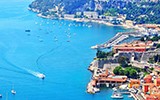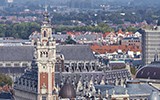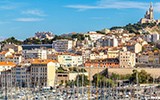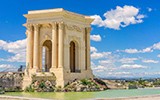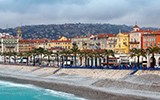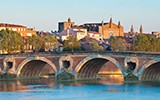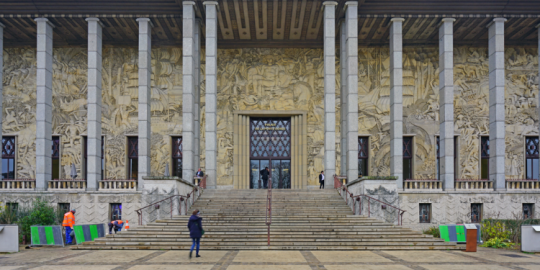What makes France truly special and magical is certainly its fabulous cultural and tourist heritage. Its exceptional mosaic of ...
Living in France guide for expats
All the information you need to relocate and live in France.
Our selection of articles for expatriation in France
A true love affair has developed between Australians and France. The reasons for this are numerous but often include the ...
France can certainly be considered the pearl of Europe with its rich centuries-long history, fabulous and exquisite cuisine known ...
The working holiday agreement between Argentina and France, signed in February 2011 in Paris, allows Argentine citizens to come ...
Signed in Hong Kong in May 2013, the Working Holiday Visa agreement with France officially came into force in July 2013. This ...
Are you Japanese, and have you always dreamed of exploring the length and breadth of France for several months with the ...
Thanks to the agreement signed between France and South Korea in October 2008 and officially in force since January 2009, South ...
One barely has to introduce Paris. The city is famous for its unparalleled historical and architectural heritage. Paris is ...
Looking for a job in Paris? Although the Parisian job market may seem daunting, there are plenty of resources available to those ...
Being the new girl or the new guy can be pretty intimidating. But with little preparation can save you from faux-pas and ...
With a population of over 2 million, it won't come as a surprise to you that Paris can get real busy! Where do you go if you want ...
Paris is a unique city with dazzling architecture, upscale restaurants, and a rich history that welcomes residents and tourists ...
Before starting to build your professional network in Paris, you will need to familiarize yourself with the cultural and ...
The 2.1 million Parisians make the French capital city a vibrant center for socializing, from cafés or ...
While the price of real estate has skyrocketed in Paris (almost €15,000 per square meter), the market remains one of the ...
About France
Whilst populism has taken many world powers by storm, France bucked the trend during the latest elections, propelling its youngest ever president, Emmanuel Macron, to the position of President of the French Nation in 2017. A fascinating country combining old and new, France has for a long time been the most visited country of the world; a tribute to its rich and diverse culture.
Located in Western Europe, France is a democratic Republic with more than 67 million inhabitants (according to 2018 estimates). Stretching over 632,834 km², including 551,695 km² in the metropolis, it is surrounded by Italy, Spain, Andorra, Germany and Switzerland. France is divided into 27 regions and 101 departments. Beyond its European borders, the country also includes French departments, overseas territories and regions.
Overseas Departments and regions:
Guadeloupe
Martinique
Guyana
Reunion Island
Mayotte
Overseas Communities:
Saint Pierre and Miquelon
Saint Barthelemy
Saint-Martin
Wallis and Futuna
French Polynesia
New Caledonia, for its part, is a former Overseas Territory which now has a special status.
France is nicknamed the 'Hexagon' because the mainland is shaped by six sides. Paris (also known as the 'City of Lights') is its capital city, while Bordeaux, Lille, Lyon, Marseille, Nice, Nantes, Strasbourg, Toulon and Toulouse are its major cities.
France has one of the highest GDPs in the world and ranks in the top 30 for GDP per capita. France is a semi-presidential representative democratic republic and has a strong tradition of reinventing its political systems, a testament to the strong democratic principles ingrained in the country. Before the introduction of the Euro, France used to deal in French francs. Nowadays, some people still speak in francs with nostalgia. In fact, one of the candidates to the latest presidential elections ran part of her campaign on a return to the Franc. Since the French Revolution era, the country is guided by the national motto, Liberté, Egalité, Fraternité, which translates to Liberty, Equality and Fraternity, that you will often see adorning official documents and public insignia. The attachment to the motto is very strong, especially in recent times which have seen attacks on the secular traditions of the French republic.
The French economy
France is one of the economic powerhouses of the world, with an estimated GDP of 2,583 billion euros. The national economy is mainly based on the services sector, which employs almost 70% of the active population. Agriculture also makes a significant contribution to the economy: France is one of the leaders in the European Union in terms of agricultural production. France is also the worldwide leader in terms of viticulture and is a large producer of wine and spirits despite increasing competition from a range of newcomers. Despite the fundamental strengths of the French economy, the country has suffered from severe unemployment and hasn't produced a balanced budget for some years. France is also heavily indebted, and the state of the French economy became a major issue during the 2017 elections.
If you are looking to work in France, it is best to focus on sectors which require highly skilled individuals. Because of the high rates of unemployment, it is difficult to move to France to carry out low-skilled work, unless one holds an EU passport. Some areas which are potentially interesting for expatriates include new technologies, research, finance and insurance, tourism and luxury, agrifood, energy, aerospace, automotive, construction, the chemical industry, the railway, aviation, pharmaceuticals and cosmetics.
Gastronomy in France
French cuisine is world-famous and often associated with luxury, sophistication and finesse. Each region has its own specialities, and culinary exploration of France is one exciting task you can set yourself upon moving to the country. Did you know, for example, that there are as many varieties of cheese as there are days in a year? Whilst the French are deeply attached to their cuisine, the country also hosts many international restaurants, especially due to the presence of expatriate communities and to the cosmopolitan nature of its population. This is particularly true in the larger cities.
History and culture in France
France has a rich and diverse history, with many significant milestones which have seen themselves transformed into Hollywood blockbusters and larger-than-life characters. Marie Antoinette, the French kings, Napoleon and Charles de Gaulle are just a few of the names which have defined and shaped the history of this great nation. French history dates back to the 5th century when the French fought the Romans after which the nation built up a formidable historical heritage, remnants of which are still obvious today. Over the years, France has done an excellent job of preserving its great historical and cultural legacy through its cathedrals, museums, historic sites and other monuments.
For soon-to-be expatriates
France has been portrayed in a negative light in foreign media when it comes to strikes and labour disputes. It is, in fact, true that the French are strongly attached to the rights that they have acquired through centuries of struggle against 'higher powers'. While many may scoff at strikes, the right to strike and protest is deeply respected in France - what is more, the French enjoy a quality of life which is second to none, whilst being one of the most productive nations in the world.
The legal working week in France is 35 office hours, and overtime is paid. Employees are entitled to five weeks of local leave per year, along with the RTT, which means 'Recovering Working Time' for those who have worked more than 35 hours a week. The French are entitled to a generous social protection system which is essentially based on solidarity, housing benefits and other social advantages which ensure that the weakest sections of society are able to lead decent and fulfilling lives.
If you are moving to France with your children, they will be entitled to free education, unless you prefer to enrol them in a private or an international school. Indeed, as the population of expatriates has grown, more and more schools have mushroomed around the country to cater to international students. The educational system is quite different from Anglo-Saxon models, and it can be daunting for newcomers to adapt to the French education system, both at the secondary level and university. Nevertheless, France is home to some of the most prestigious academic institutions in the world, including école Polytechnique, HEC Business School, the école Nationale d'Administration (ENA) and INSEAD.
Latest housing offers in France
Latest job offers in France


